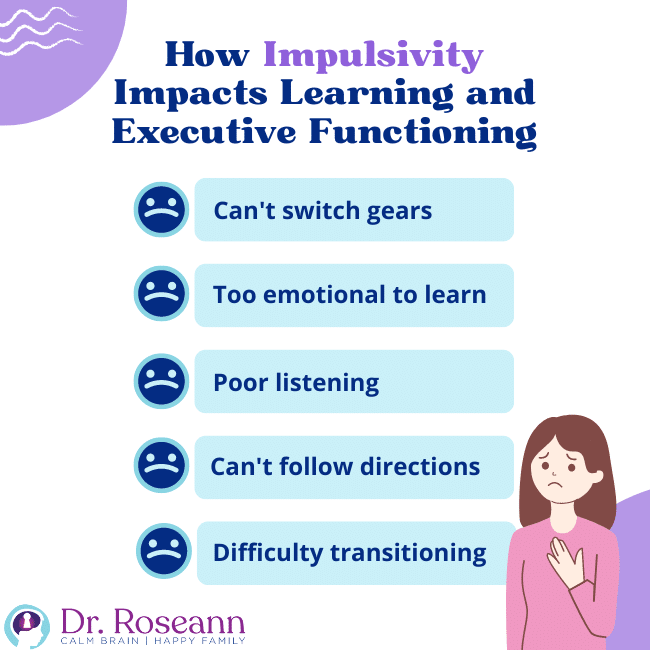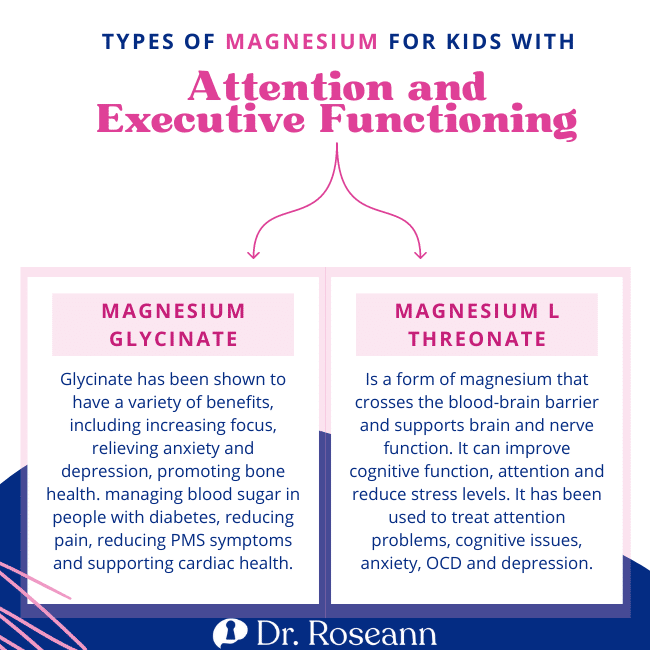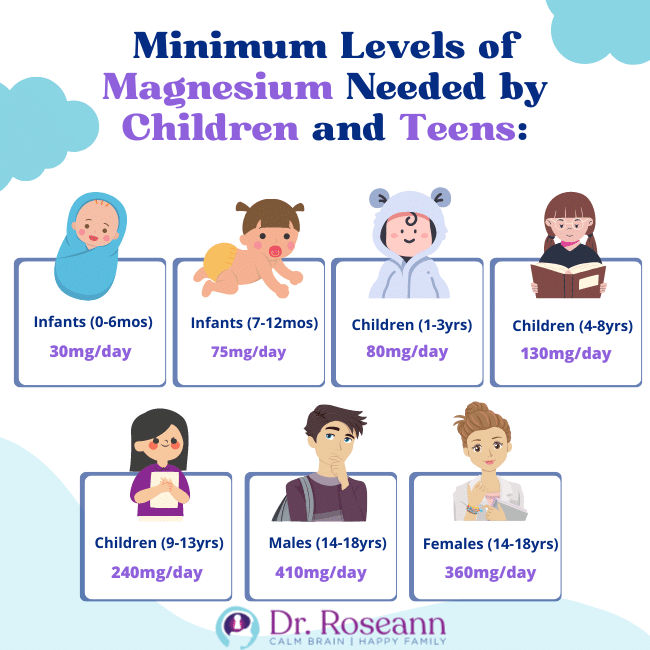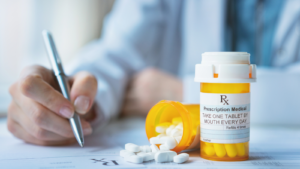Magnesium is an essential nutrient involved in many functions within the central nervous system, including cellular transmission and intracellular signal transduction. Magnesium is needed for proper brain functioning.
The literature is clear that there is a relationship between the levels of magnesium and the presence of psychiatric pathology in several areas including anxiety, depression, OCD and anxiety. Jacko et. al (2009) found that there was a relationship between low magnesium levels and anxiety and depression.
Magnesium is important for helping the nervous system regulate. We know through research that low levels of Magnesium is associated with increased externalizing behaviors (Black et.al, 2015). In particular, the combination of Magnesium and B6 is an especially powerful combination that calms the central nervous system.
How is Hyperactive-Impulsive ADHD Different from Inattentive ADHD?
For those diagnosed with ADHD, they know that ADHD symptoms vary from person to person but most experience difficulty staying focused and completing tasks.
For the child with inattentive-type ADHD, they may be described as a “daydreamer,” may zone out a lot and may be more internally distracted. They get lost in their thoughts.
For the child with hyperactive-impulsive-type ADHD, regulating and controlling one's responses is at the core of the issue. Having enough control to stop what they are doing, ignore stimuli, and transition when they are supposed to are their greatest challenges.
Kids who are impulsive can also be very emotionally reactive and behavioral. While their behavior is more likely to get them help earlier, their impulsive behavior gets in the way of relationships with others. An impulsive child needs a lot of correction and those constant reminders can lead to rejection sensitivity and defensiveness about criticism.
How Impulsivity Impacts Learning and Executive Functioning
When a child struggles with behavioral inhibition or impulse control, a child will be unable to consistently get to the higher level earning activities and executive functioning skills. If you think about it, it makes sense that if you can't put the brakes on, you won't be connected and regulated enough to pay attention or think.
In fact, taking any kind of consistent action will be a problem when you can't control your responses. Getting tasks done at school and home is a constant challenge. Listening, emotional regulation, transitioning or attentional switching is a problem.
Attention and executive functioning are two interrelated but separate functions that are needed for children to learn. Attention is the brain's ability to get in an alert state and it is needed for listening and memory. If you aren't paying attention, then you can't hear directions at the time they are given.
Executive function is a set of cognitive skills that help a person plan, organize and prioritize for a future task, action, or event. It is all those mental skills you need to produce anything from a class project, dinner, or buy a car. You have to be able to juggle things in your mind to get what you need to get done.
Executive Functioning Dysfunction is different from ADHD but both are conditions that impact learning and interfere with a child's daily functioning. Executive functioning skills can be learned, so it is important for parents to concentrate on teaching foundational skills that can help kids get to higher level learning activities..
What Does The Research Say About Magnesium Deficiency and Behavior?
Getting enough magnesium through food or direct supplementation is important for brain and mental health. In one large scale study, high dietary intake of Magnesium was associated with decreased depression and anxiety in adults (Keshteli et. al, 2018).
Low magnesium levels are also associated with callous or unemotional traits in children (Portnoy, 2021). Along with B6, magnesium is involved in neurochemical processes implicated in modulating antisocial behavior and callous or unemotional traits.
In the Journal of Medical Human Genetics, a 2016 found that (72%) of ADHD children in the study had a magnesium deficiency. The researchers speculated that a magnesium deficiency in ADHD is due to behavioral manifestation related to the core pathology of ADHD. Inattentiveness, feeding problems, and low dietary intake due to psychostimulant medication side effects are at the core of why children with ADHD have low magnesium levels.
Research shows us that having good levels of magnesium is associated with lower levels of anxiety, depression, ADHD symptoms. Low levels of Magnesium is associated with increased externalizing behaviors (Black et.al, 2015). And that the inverse, high levels of magnesium is associated with lower externalizing behaviors. In this study, the dietary intake of magnesium in teens was examined and the Youth Self Resort (YSR) rating scales were used to look at internalizing and externalizing behaviors.
The combination of Magnesium and B6 has been shown to calm the central nervous system. In one study, behaviors related to hyperexcitability (physical aggressivity, instability, scholar attention, hypertony, spasm, myoclony) were reduced after 1 to 6 months of Magnesium treatment (Mousain-Bosc, 2004). In this study, combined Mg(2+)/vitamin B6 intake (100 mg/day) for 3 to 24 weeks restored normal levels and reduced abnormal behaviors.
Types of Magnesium for Kids with Attention and Executive Functioning Issues
All forms of magnesium are important for the nervous system and body. However, some forms of magnesium are especially beneficial for the brain. Magnesium Glycinate and Magnesium L threonate are two of the best forms for attention and executive functioning.
Magnesium Glycinate
Glycinate has been shown to have a variety of benefits, including increasing focus, relieving anxiety and depression, promoting bone health. managing blood sugar in people with diabetes, reducing pain, reducing PMS symptoms and supporting cardiac health.
Magnesium L Threonate
Is a form of magnesium that crosses the blood-brain barrier and supports brain and nerve function. It can improve cognitive function, attention and reduce stress levels. It has been used to treat attention problems, cognitive issues, anxiety, OCD and depression.
How Much Magnesium Do You Need to Improve ADHD Symptoms?
Ideally, getting magnesium through your diet is what we all should be doing. The reality is that we are all so super stressed that getting enough magnesium only through your diet isn't going to cut it.
Moreover, due to a number of digestive factors, only 20-40% of magnesium is actually absorbed through our food (Bohn, 2008). In addition, research has shown that children with ADHD just don't eat enough in general to get enough magnesium from their diet. Their dietary intakes of magnesium are low according to research, with 72% of children with ADHD showing low levels.
Patients with ADHD Attention Deficit Hyperactivity Disorder often gravitate toward low nutrient foods such as breads, grains, and processed meats that just don't help the brain enough.
The good news is that supplements are available to help fill the gap and get the ADHD brain function more optimally. Attention and hyperactivity can significantly improve with tweaks to diet and supplementation.
Minimum Levels of Magnesium Needed by Children and Teens:
- Infants (0-6 months): 30 mg/day
- Infants (7-12 months): 75 mg/day
- Children (1-3 years): 80 mg/day
- Children (4-8 years): 130 mg/day
- Children (9-13 years): 240 mg/day
- Males (14-18 years): 410 mg/day
- Females (14-18): 360 mg/day
Parents can feel good about increasing magnesium in the child's diet through magnesium-rich foods and magnesium supplementation.
Citations
Baza, F. AlShahawi, H., Zahra, S, AbdelHakim, R. (2016), Magnesium supplementation in children with attention deficit hyperactivity disorder. Egyptian Journal of Medical Human Genetics, Volume 17, Issue 1, 63-70, ISSN 1110-8630, https://doi.org/10.1016/j.ejmhg.2015.05.008.
Black, L. J., Allen, K. L., Jacoby, P., Trapp, G. S., Gallagher, C. M., Byrne, S. M., & Oddy, W. H. (2015). Low dietary intake of magnesium is associated with increased externalising behaviours in adolescents. Public health nutrition, 18(10), 1824–1830. https://doi.org/10.1017/S1368980014002432
Bohn T. Dietary Factors Influencing Magnesium Absorption in Humans. Current Nutrition & Food Science. 2008;4:53-72.
Botturi, A., Ciappolino, V., Delvecchio, G., Boscutti, A., Viscardi, B., & Brambilla, P. (2020). The Role and the Effect of Magnesium in Mental Disorders: A Systematic Review. Nutrients, 12(6), 1661. https://doi.org/10.3390/nu12061661
Jacka, F. N., Overland, S., Stewart, R., Tell, G. S., Bjelland, I., & Mykletun, A. (2009). Association between magnesium intake and depression and anxiety in community-dwelling adults: the Hordaland Health Study. The Australian and New Zealand journal of psychiatry, 43(1), 45–52. https://doi.org/10.1080/00048670802534408
Keshteli, A., Afshar, H., Esmaillzadeh, A., & Adibi, P. (2018). The association between dietary intake of magnesium and psychiatric disorders among Iranian adults: a cross-sectional study. The British journal of nutrition, 120(6), 693–702. https://doi.org/10.1017/S0007114518001782
Mousain-Bosc, M., Roche, M., Rapin, J., & Bali, J. P. (2004). Magnesium VitB6 intake reduces central nervous system hyperexcitability in children. Journal of the American College of Nutrition, 23(5), 545S–548S. https://doi.org/10.1080/07315724.2004.10719400
Portnoy, J., McGouldrick, S. H., Raine, A., Zemel, B. S., Tucker, K. L., & Liu, J. (2021). Lower dietary intake of magnesium is associated with more callous-unemotional traits in children. Nutritional neuroscience, 1–10. Advance online publication. https://doi.org/10.1080/1028415X.2021.1963064
Starobrat-Hermelin, B., & Kozielec, T. (1997). The effects of magnesium physiological supplementation on hyperactivity in children with attention deficit hyperactivity disorder (ADHD). Positive response to magnesium oral loading test. Magnesium research, 10(2), 149–156.
Always remember… “Calm Brain, Happy Family™”
Are you looking for SOLUTIONS for your struggling child or teen?
Dr. Roseann and her team are all about solutions, so you are in the right place!
There are 3 ways to work with Dr. Roseann:
You can get her books for parents and professionals, including: It’s Gonna Be OK™: Proven Ways to Improve Your Child’s Mental Health, Teletherapy Toolkit™ and Brain Under Attack: A Resource For Parents and Caregivers of Children With PANS, PANDAS, and Autoimmune Encephalopathy.
If you are a business or organization that needs proactive guidance to support employee mental health or an organization looking for a brand representative, check out Dr. Roseann’s media page and professional speaking page to see how we can work together.
Dr. Roseann is a Children’s Mental Health Expert and Licensed Therapist who has been featured in/on hundreds of media outlets including The Mel Robbins Show, CBS, NBC, PIX11 NYC, Today, FORBES, CNN, The New York Times, The Washington Post, Business Insider, Women’s Day, Healthline, CNET, Parade Magazine and PARENTS. FORBES called her, “A thought leader in children’s mental health.”

She coined the terms, “Re-entry panic syndrome” and “eco-anxiety” and is a frequent contributor to media on mental health.
Dr. Roseann Capanna-Hodge has three decades of experience in working with children, teens and their families with attention-deficit hyperactivity disorder (ADHD), autism, concussion, dyslexia and learning disability, anxiety, Obsessive Compulsive Disorder (OCD), depression and mood disorder, Lyme Disease, and PANS/PANDAS using science-backed natural mental health solutions such as supplements, magnesium, nutrition, QEEG Brain maps, neurofeedback, PEMF, psychotherapy and other non-medication approaches.
She is the author of three bestselling books, It’s Gonna Be OK!: Proven Ways to Improve Your Child's Mental Health, The Teletherapy Toolkit, and Brain Under Attack. Dr. Roseann is known for offering a message of hope through science-endorsed methods that promote a calm brain.
Her trademarked BrainBehaviorResetⓇ Program and It’s Gonna be OK!Ⓡ Podcast has been a cornerstone for thousands of parents facing mental health, behavioral or neurodevelopmental challenges.
She is the founder and director of The Global Institute of Children’s Mental Health, Neurotastic™Brain Formulas and Dr. Roseann Capanna-Hodge, LLC. Dr. Roseann is a Board Certified Neurofeedback (BCN) Practitioner, a Board Member of the Northeast Region Biofeedback Society (NRBS), Certified Integrative Mental Health Professional (CIMHP) and an Amen Clinic Certified Brain Health Coach. She is also a member of The International Lyme Disease and Associated Disease Society (ILADS), The American Psychological Association (APA), Anxiety and Depression Association of America (ADAA) National Association of School Psychologists (NASP), International OCD Foundation (IOCDF).
© Roseann-Capanna-Hodge, LLC 2023
Disclaimer: This article is not intended to give health advice and it is recommended to consult with a physician before beginning any new wellness regime. *The effectiveness of diagnosis and treatment vary by patient and condition. Dr. Roseann Capanna-Hodge, LLC does not guarantee certain results.

















